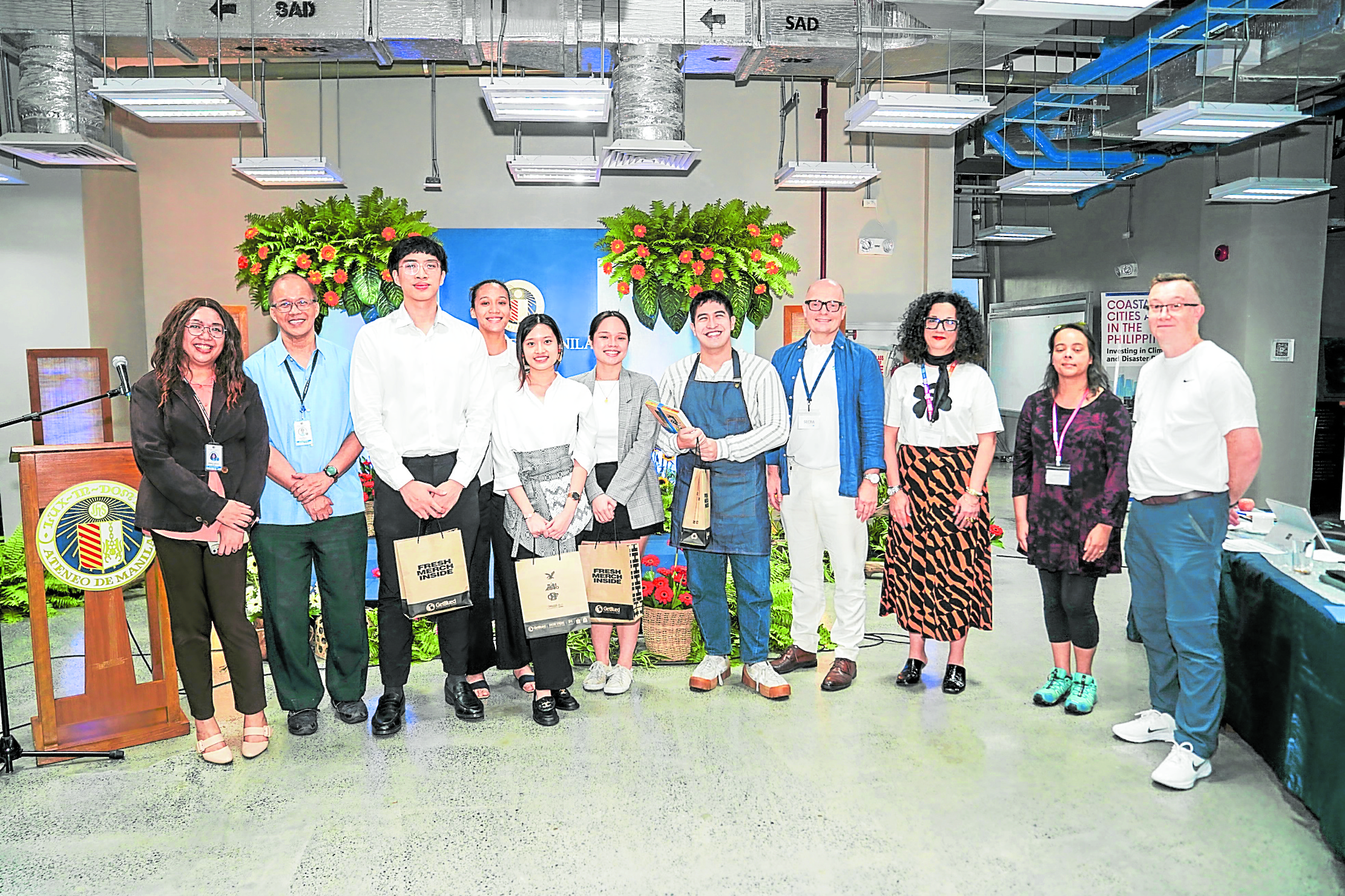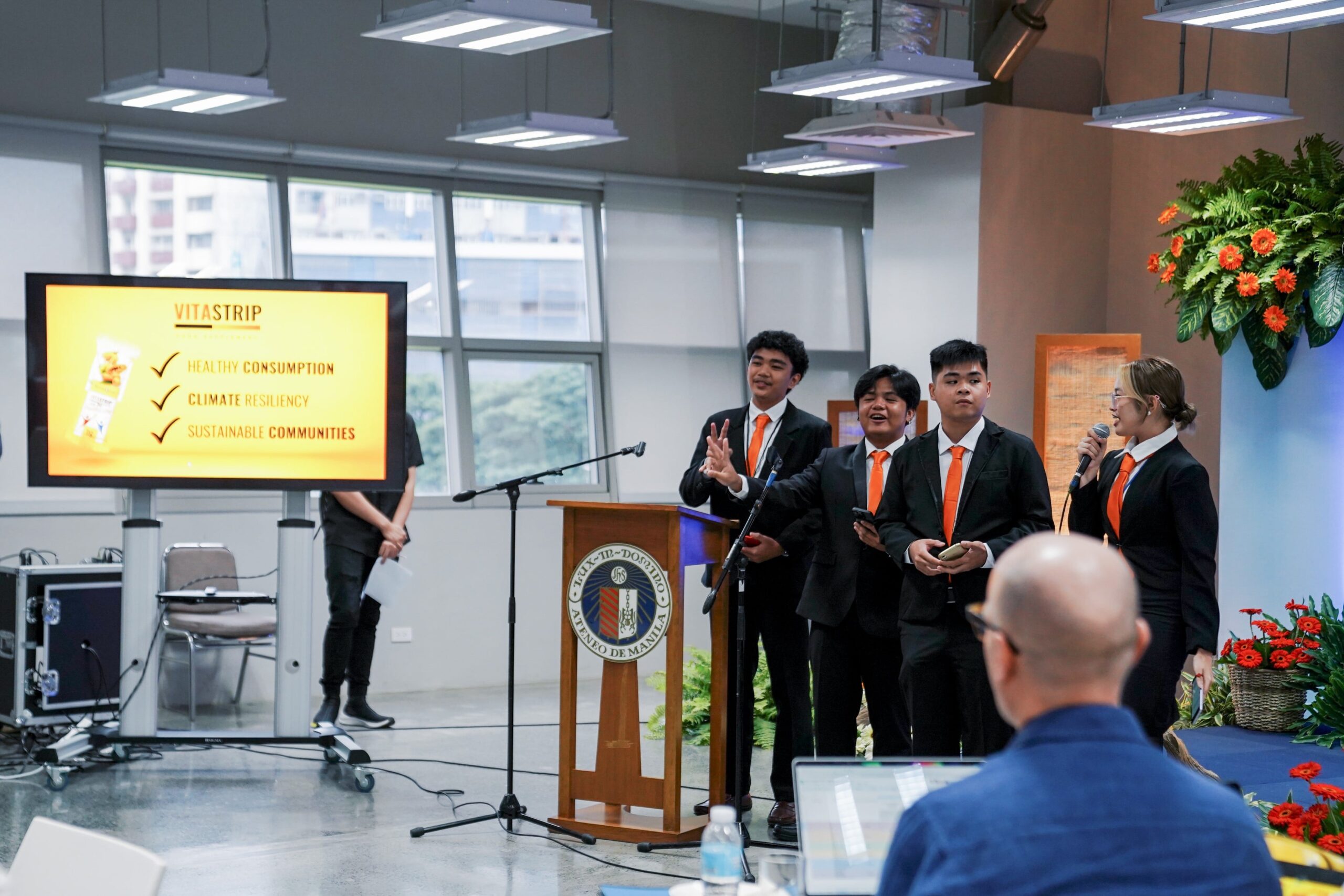How cross-collaborations can help build healthy, resilient communities

FRESH IDEAS The winning group of students from Ateneo de Manila University, who pitched a sustainable food catering service, pose for a photo with the panel of judges and their instructor.
This year, as the global community celebrates World Environment Day, there is a need to reflect on the complexity of environmental challenges and the need to build the resilience of our communities.
Resilience is crucial for sustainable development, given that growth and progress are hindered by repeated losses and damages due to hazards. Likewise, a healthy ecosystem and community would be less vulnerable to hazards and other stressors.
As our societies constantly grapple with the interconnected issues of pollution, biodiversity loss, deforestation and increased warming of atmospheric temperatures, we know that interconnected challenges must be met with interconnected efforts. This comes with the increased awareness of the need for collaborative approaches, as reflected in the Sustainable Development Goals (Goal 17 in particular is called “Partnerships for Sustainability”).
It is vital for academia, industry, government and civil society to come together to address these shared challenges. This nexus—the “quadruple helix of innovation”—has the potential to synergize and magnify positive impacts toward sustainable development.
The Strengthening University-Enterprise Collaboration for Resilient Communities in Asia (Secra) Project was formed from that idea of cross-collaboration. Established in 2021, Secra drew together collaborators from higher education institutions (HEIs) spread across six partner countries: Sweden, Estonia, the Philippines, Sri Lanka, Thailand, and the United Kingdom. Co-funded by the Erasmus+ Programme of the European Union, Secra aims to investigate the often ad hoc and episodic quality of university-enterprise collaborations (UEC) in the field of disaster resilience and in achieving resilience outcomes, especially in the face of the climate crisis.
With the aim of establishing resilience as a foundation for sustainable communities, Secra seeks to identify pathways to institutionalize mechanisms for these collaborations, in order to harness the collective wisdom and resources of academia, industry, government and civil society to address the pressing socio-ecological challenges of this generation and generations to come. The consortium is led by Mid Sweden University. In the Philippines, partner institutions include Ateneo de Manila University, Mapúa Malayan Colleges Laguna and Philippine Normal University.
Common understanding
Seeking to forge common understanding on the conduct of UECs, partners and collaborators from Ateneo de Manila University organized a series of university-enterprise engagement days. Held in November 2022, May 2023, July 2023 and November 2023, these events marked significant milestones in the Secra Project’s mission to forge connections between Filipino startups, investors, the academe, government agencies and civil society organizations to identify points of collaboration for increasing community resilience.
These engagement days served as a common platform to emphasize the role of startups and industry partners in both sustainability and resilience, the business case for sustainability through ESG (environmental, social and governance framework), and how these different issues are interconnected. For instance, a business can thrive within a resilient community if it makes sustainable use of its resources, but may face increased pressure if the community is highly vulnerable to disasters such as floods or pandemics, or if it depletes its resources faster than they can be replenished. Business continuity is thus intimately related to sustainability and resilience.
Similarly, partners from Mapúa Malayan Colleges Laguna organized a collaborative event in January 2023. The focus was on exploring innovative initiatives by the Philippine government, local agencies and private entities regarding disaster resilience and climate preparedness. Key stakeholders from UP Resilience Institute and the Philippine Disaster Risk Reduction Management Office delivered talks that emphasized the importance of climate action and resilient business approaches during disasters.
Leveraging on its identity as a teacher education and research university, partners from Philippine Normal University organized a disaster risk reduction and management (DRRM) training for preservice teachers in July 2023. This training, in collaboration with the Manila Disaster Risk Reduction Management Office and Palmer Asia, provided preservice teachers DRRM training and included lectures on climate change and community resilience, as well as training in first aid, cardiopulmonary resuscitation, basic rescue and basic firefighting.

THE PITCH Student pitchers from Mapua Malayan University present their sustainability- and resilience-related product, a food supplement, to a panel of judges and audience members composed of collaborators from the Secra Project consortium and partner offices from Ateneo deManilaUniversity. — CONTRIBUTED PHOTO
This event highlighted the potential of magnifying positive impacts toward community resilience, by equipping preservice teachers with foundational training that they could take with them to their future schools of employment. It also underscored the role of education in achieving community resilience.
Among the key events of the Secra Project are a series of project meetings held in partner countries, scheduled throughout the project lifetime. For the Philippines, the week-long gathering was held in November 2023, with Philippine partners jointly organizing the Metro Manila meeting for the Secra Project consortium. Part of the proceedings was a policy dialogue with representatives from the national government, the local government of Quezon City, the private sector and civil society, focusing on the country policy brief jointly prepared by the three Philippine partner HEIs. The document outlined identified models of UECs, as well as observed gaps and proposed interventions.
In addition, the Metro Manila meeting took stock of the project’s progress across the substantive work packages, and included a campus visit to Ateneo de Manila University. This included flash talks from partner offices and a student pitching competition showcasing products and services geared toward fostering sustainability and resilience, by addressing a number of the Sustainable Development Goals.
Much promise
Student pitchers presented products and services such as a mobile evacuation tent, an energy consumption calculator and planner application, a rotational-energy powered bicycle light, food supplements to address hunger and malnutrition, and a sustainable food catering service that featured climate-friendly food and zero plastic. The culmination of the weeklong event was marked by a whole-day excursion program organized by partners from Philippine Normal University, during which consortium members learned more about Philippine heritage and culture as an important dimension of sustainability and resilience.
As the project draws to a close this July, members of the consortium, particularly partners from the Philippines, will be reflecting on the achievements of the Secra Project and how these can be expanded upon. In a country grappling with environmental crises and vulnerable to natural and human-induced hazards, the policy brief holds much promise for how other sectors can be meaningfully engaged, by addressing the systemic nature of UECs rather than treating them as one-off partnerships.
While the project has achieved much in its three-year lifetime, there is still much left to do—more partners to engage, and more collaborations to explore. Partner HEIs are now exploring other funding streams to establish new networks with organizations who share the same advocacies, seeking to sustain the gains of the project. Interested parties may visit the Secra website at https://drrcollab.org/ or get in touch at secra@ateneo.edu.
The Ateneo Institute of Sustainability (AIS) was established in 2013 as the hub on sustainable development of Ateneo de Manila University. Within the university, it is one of the implementing partners of the Secra Project, together with the Ateneo Intellectual Property Office, John Gokongwei School of Management, Department of Environmental Science, and Ateneo Research Institute of Science and Engineering.
This article was written by Daniel C. Ratilla and Ivy Geraldine Ferrer, with inputs from Jean Jardeleza Mijares and Dr. C. Kendra Gotangco Gonzales. Gotangco Gonzales, Mijares, Ratilla and Ferrer are from the Ateneo Institute of Sustainability and the Department of Environmental Science, Ateneo de Manila University.
